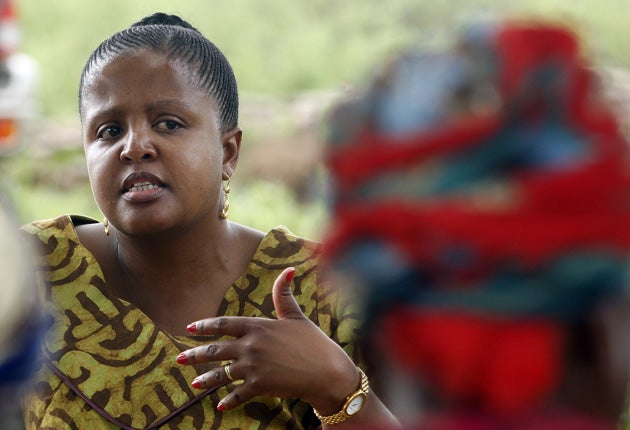Swaziland's No 1 lady detective wins green prize

Your support helps us to tell the story
From reproductive rights to climate change to Big Tech, The Independent is on the ground when the story is developing. Whether it's investigating the financials of Elon Musk's pro-Trump PAC or producing our latest documentary, 'The A Word', which shines a light on the American women fighting for reproductive rights, we know how important it is to parse out the facts from the messaging.
At such a critical moment in US history, we need reporters on the ground. Your donation allows us to keep sending journalists to speak to both sides of the story.
The Independent is trusted by Americans across the entire political spectrum. And unlike many other quality news outlets, we choose not to lock Americans out of our reporting and analysis with paywalls. We believe quality journalism should be available to everyone, paid for by those who can afford it.
Your support makes all the difference.Thuli Brilliance Makama is not everyone's idea of an environmental hero.
An attorney in Swaziland, Africa's last absolute monarchy, she has made her name not as a conservationist but by investigating the deaths of suspected poachers.
Yesterday she was named as among the winners of the most prestigious environmental award in the world: the $150,000 Goldman Prize. Leading the Swazi green group Yonge Nawe, she has worked with local communities to help them to file lawsuits against the kingdom's flourishing private game parks. While the prize committee said it had made the award on the basis of her victory in a three-year effort to open up Swaziland's Environment Authority to public participation, Ms Makama is better known for standing up to private game reserves whose rangers have been accused of indiscriminate killings of poachers. By defending poachers, she could, arguably, be presented as an anti-conservationist, but that would ignore the complexities of African politics.
The mountainous kingdom on South Africa's north-eastern border with Mozambique has been the scene of a deepening conflict between parks and people. While half of the one million Swazi population lives in poverty, blighted by food and water shortages, the kingdom has become a popular safari and big-game hunting destination. Swaziland's parks are not controlled by the government but by a private company, Big Game Parks, whose rangers enjoy immunity from prosecution as long as they are "protecting game".
The prize is seen by some as an affront to the man they claim to be the father of conservation in Swaziland, the owner and operator of Big Game Parks, Ted O'Reilly. The son of a British soldier who settled in the area after the Boer War, he persuaded a previous king to establish parks to protect wildlife against poachers and commercial farmers.
Big Game Parks has a strong record on wildlife protection but its tactics remain controversial. In 1992, with the help of the South African police, Mr O'Reilly tracked men suspected of poaching rhino in one of the Swazi parks to a nearby hotel. Two of them were killed in the ensuing shoot-out.
Local communities, many of whom were moved off their land by expanding parks, have complained of a steep increase in numbers of people shot or killed for suspected poaching. The 1992 case has been included in a suit filed against the company by Ms Makama, who says that as many as 50 local people have been killed since BGP was given immunity in 1997.
Mr O'Reilly insists that without his company Swaziland's parks would not exist and that his rangers act within the law. "Very similar numbers of rangers have been killed in the line of duty by poachers as vice versa," he told the Associated Press.
The award-winning attorney insists that ordinary people are struggling to survive on the fringes of the parks, depending on food aid and killing the occasional antelope. "These are just hunters and gatherers who need this to survive. People are being killed for hunting a small impala," she said.
Yesterday, the world's leading environment prize gave its verdict: "For many years, these communities have endured brutality and abuse at the hands of armed reserve owners, and a number of suspected poachers have been killed in the name of conserving the fenced-in wildlife," the Goldman organisation said on its website.
The Goldman Prize is awarded annually to six "grassroots environmentalists" – one from each of the continents. This year's other winners include Randall Arauz from Costa Rica, who has campaigned against the shark fin industry, and Poland's Malgorzata Gorska, who helped to block a road project that threatened one of Europe's last wilderness areas. Past winners include Brazil's former environment minister Marina da Silva.
Join our commenting forum
Join thought-provoking conversations, follow other Independent readers and see their replies
Comments